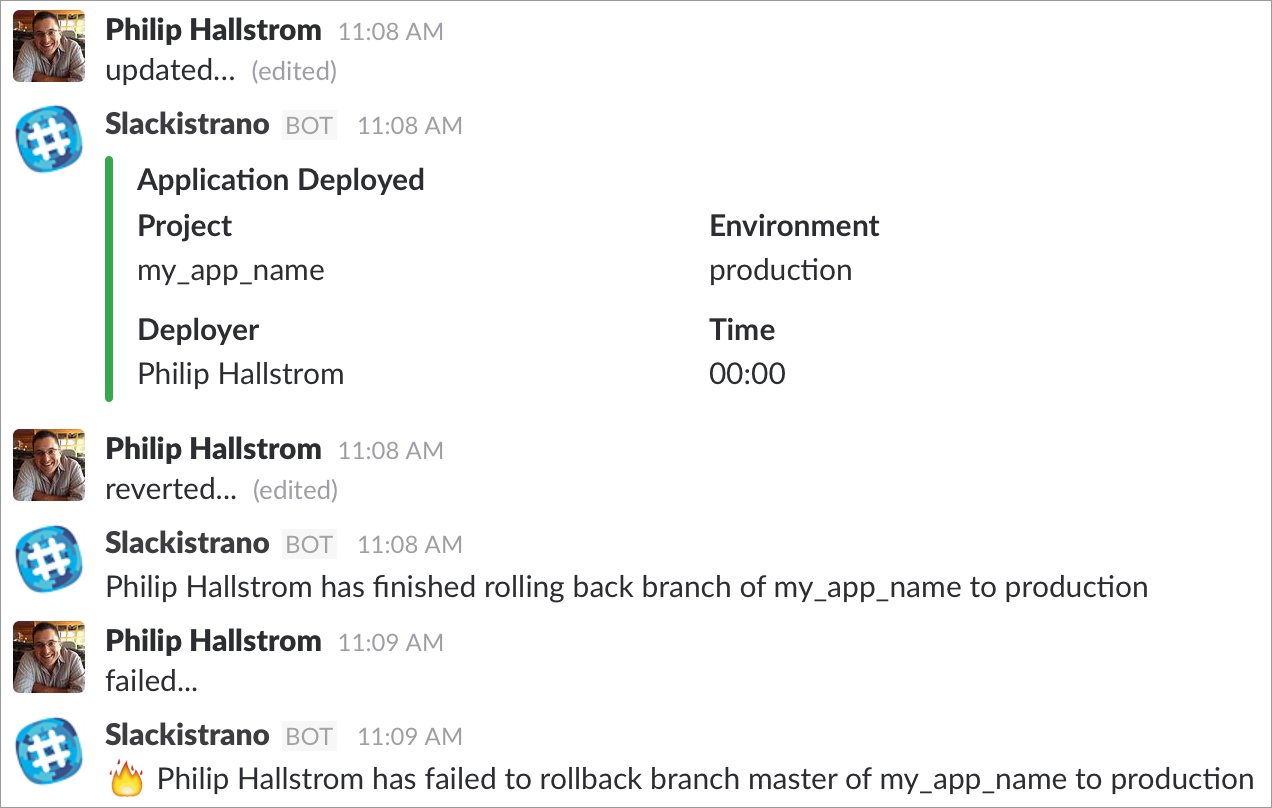Slackistrano



Send notifications to Slack about Capistrano deployments.
Requirements
- Capistrano >= 3.8.1
- Ruby >= 2.0
- A Slack account
Installation
-
Add this line to your application's Gemfile:
gem 'slackistrano'
-
Execute:
$ bundle
-
Require the library in your application's Capfile:
require 'slackistrano/capistrano'
Configuration
You have two options to notify a channel in Slack when you deploy:
- Using Incoming WebHooks integration, offering more options but requires
one of the five free integrations. This option provides more messaging
flexibility.
- Using Slackbot, which will not use one of the five free integrations.
Incoming Webhook
-
Configure your Slack's Incoming Webhook.
-
Add the following to config/deploy.rb:
set :slackistrano, {
channel: '#your-channel',
webhook: 'your-incoming-webhook-url'
}
Slackbot
-
Configure your Slack's Slackbot (not Bot).
-
Add the following to config/deploy.rb:
set :slackistrano, {
channel: '#your-channel',
team: 'your-team-name',
token: 'your-token'
}
Optional Configuration & Overrides
By default Slackistrano will use a default icon and username. These, can be
overriden if you are using the default messaging class (ie. have not specified
your own).
-
Configure per instructions above.
-
Add the following to config/deploy.rb:
set :slackistrano, {
...
username: 'Foobar the Deployer',
icon_emoji: ':thumbsup:',
icon_url: 'https://avatars2.githubusercontent.com/u/16705?v=4&s=40',
...
}
Test your Configuration
Test your setup by running the following command. This will post each stage's
message to Slack in turn.
$ cap production slack:deploy:test
Usage
Deploy your application like normal and you should see messages in the channel
you specified.
Customizing the hooks
If you wish to take control over when and what slackistrano hooks are fired, then you can use the option in deploy.rb:
set :use_custom_slackistrano_hooks, true
This allows you to set custom hooks for all the slackistrano tasks:
'slack:deploy:starting'
'slack:deploy:updating'
'slack:deploy:reverting'
'slack:deploy:updated'
'slack:deploy:reverted'
'slack:deploy:failed'
Customizing the Messaging
You can customize the messaging posted to Slack by providing your own messaging
class and overriding several methods. Here is one example:
if defined?(Slackistrano::Messaging)
module Slackistrano
class CustomMessaging < Messaging::Base
def channels_for(action)
if action == :failed
"#ops"
else
super
end
end
def payload_for_starting
nil
end
def payload_for_updating
nil
end
def payload_for_reverting
nil
end
def payload_for_updated
{
attachments: [{
color: 'good',
title: 'Integrations Application Deployed :boom::bangbang:',
fields: [{
title: 'Environment',
value: stage,
short: true
}, {
title: 'Branch',
value: branch,
short: true
}, {
title: 'Deployer',
value: deployer,
short: true
}, {
title: 'Time',
value: elapsed_time,
short: true
}],
fallback: super[:text]
}],
text: "<!here> Application Deployed!"
}
end
def payload_for_reverted
super
end
def payload_for_failed
payload = super
payload[:text] = "OMG :fire: #{payload[:text]}"
payload
end
def deployer
name = `git config user.name`.strip
name = nil if name.empty?
name ||= Etc.getpwnam(ENV['USER']).gecos || ENV['USER'] || ENV['USERNAME']
name
end
end
end
end
The output would look like this:

To set this up:
-
Add the above class to your app, for example lib/custom_messaging.rb.
-
Require the library after the requiring of Slackistrano in your application's Capfile.
require_relative 'lib/custom_messaging'
-
Update the slackistrano configuration in config/deploy.rb and add the klass option.
set :slackistrano, {
klass: Slackistrano::CustomMessaging,
channel: '#your-channel',
webhook: 'your-incoming-webhook-url'
}
-
If you come up with something that you think others would enjoy submit it as
an issue along with a screenshot of the output from cap production slack:deploy:test and I'll add it to the Wiki.
Disabling posting to Slack
You can disable deployment notifications to a specific stage by setting the :slackistrano
configuration variable to false instead of actual settings.
set :slackistrano, false
TODO
- Notify about incorrect configuration settings.
Contributing
- Fork it
- Create your feature branch (
git checkout -b my-new-feature)
- Commit your changes (
git commit -am 'Add some feature')
- Push to the branch (
git push origin my-new-feature)
- Create new Pull Request







